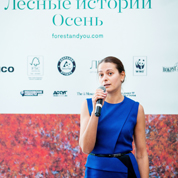Global corporations support preservation of wildlife and bioresources
Issue:
October 2013, Vol. 10
Tags:
WWF

A unique photograph exhibition, titled, The Forest Stories, was opened this autumn at the Patriarshie Ponds in the center of Moscow.
This year’s exposition is the fourth in the Forest Stories series and will last until October 20, 2013. The previous expositions, which took place on Chistoprudny Boulevard, Sokolniki and on the Patriarshie Ponds, were attended by over 55,000 visitors, according to the organisers.
Organized by PepsiCo, the US-based global food and beverages production giant with huge operations in Russia, the exhibition is a part of the All-Russian Program that is dedicated to promotion of responsible forest management practices and procurement of certification from the Forest Stewardship Council (FSC), the international non-governmental organization.
The efforts were supported by Tetra Pak, a major player in the global packaging and related solutions provision industry, FSC, the Forest Art Project and the World Wildlife Fund (WWF)
Opening the exhibition, Irina Zhuravlyov, the head of LES Art Project and curator of the Forest Stories photo expo, said the purpose of the exhibition is to show the diversity of the forest ecosystems, one of the world’s main resources. "Every visitor to the exhibition will have sincere and heartfelt dialog with the photos’ authors about the beauty of nature, wild animals, forest as a home for thousands of living beings, about the issues and problems that they are experiencing and how they can be solved," she said.
“On exposition are unique pictures taken by Russian and foreign photographers, the winners and laureates of various national and international contests.”
On exposition are unique pictures taken by Russian and foreign photographers, the winners and laureates of various national and international contests, according to the organisers. The authors of the Forest Stories photographs highlight reserved forests in all diversity, showing unique flora and fauna in their natural habitats across the globe, including those living in the most climatically unfriendly regions like the Poles and other areas. This is a totally different world, with its own laws, specificities and problems, the organizers explained.
Illegal logging still a major problem in Russia
Today, every fifth wooden product made in Russia is of doubtful origin, as trees from nature reserves and natural parks, virgin and old-growth forests, are often illegally sent for sale at home and abroad, according to FSC. The FSC certification, which involves independent auditors inspecting every stage of the industrial chain of wood production and processing, from timber procurement to its delivery to end customers, could contribute to improving this issue, the organisation added.
Today, 36mln hectares of certified forests in Russia, or about 20% of all the country’s forests, are leased out for logging, according to FSC. The FSC’s “Tick Tree” logo on timber products’ labels indicates whether such goods had come from well-managed sources and whether the manufacturer had preserved the biodiversity and ecological functions of forests during their production process.
Corporate efforts at preservation of wild life
PepsiCo was the first company on the Russian market to choose and starting using the FSC-certified packages for its products, Marina Zibareva, PepsiCo communications director in Russia/CIS, noted in her speech at the opening ceremony of the Forest Stories Photographs Exhibition.
“What happens in the future will be the result of what we do today. By organizing events, like the Forest Stories Photograph Exposition, where each photograph is a living story of the amazing and yet-so-fragile world of the forest and its inhabitants, PepsiCo is trying to attract the attention of the global audience to the importance of caring for the environment, day after day, the executive who represented PepsiCo at the event,” noted. “Caring for it is not that difficult. We all can contribute to the preservation of forests by choosing FSC-certified goods produced in a responsible way,” she added.
PepsiCo, Russia’s biggest manufacturer of foods and beverages, has invested over $9bln into the Russian economy, where it has over 30 companies and employs about 27,000 workers, according to the company’s press department.

Today, 31 of 36 Tetra Pak factories worldwide, including those in Russia and Ukraine, are FSC-certified, company executives said at the event. As reported in February 2013, the company’s facilities now produce over 26.4bln FSC-certified packages per year or over three times higher than it produced in 2010, they noted.
“Our aim is to build a transparent market in Russia, where all participants produce goods that fully meet strict environmental requirements," says Martin Fejk, the vice president for marketing at Tetra Pak in Eastern Europe and Central Asia. Promotion of the ideas of sustainable forest management contributes to the preservation of unique forests, dozens of rare and endangered species of animals and plants, Yulia Belova, the director for corporate relations at Tetra Pak in Eastern Europe and Central Asia, said. “A photo exhibition is a bright, emotional, and, therefore, an effective way to show people how much we can lose if we don’t start treating nature with care today.” One of the world’s leading food processing and packaging solutions companies, Tetra Pak employs over 23,000 employees in over 85 countries, according to the company’s press department.
Environmental education needed to improve situation
Environmental education of the population is a difficult job, which is not expected to yield results overnight, Andrew Ptichnikov, the director of the FSC’s Russian National Office. "This is why it is very important that there are traditionally a lot of children among the visitors of the exhibitions,” he added. “After all, the earlier a child begins to think about the problems of environmental protection, the greater the chances of success of efforts of adults."
Events like this exhibition are certainly of great help in solving the problems of ecology, Alexander Voropaev, the head of the Association of Environmentally Responsible Timber Producers at GFTN Russia, WWF. "Because no public meetings or advertising campaigns affect the human minds as works of art. A more persuasive language has yet to be invented.”












 Web design,
Web design,